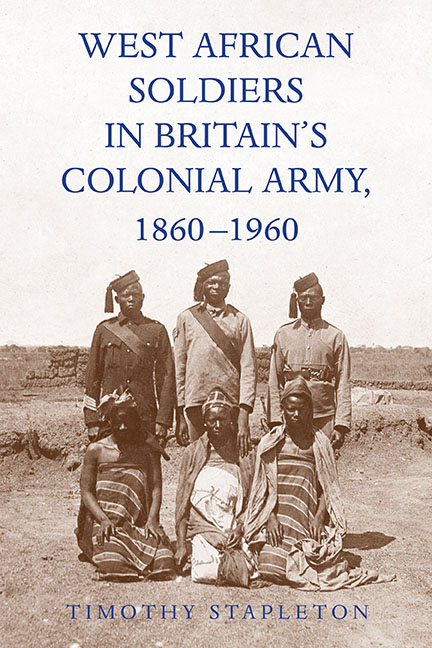Book contents
1 - Slave Origins
Published online by Cambridge University Press: 07 October 2022
Summary
The most obvious connection of the early British West African army of the late nineteenth and early twentieth centuries to older West African military systems and ways of warfighting revolved around engagement with the institution of slavery. The mobilization of slave soldiers embodied a common feature of precolonial West African military culture. While the definitions and military roles of West African slave soldiers varied over time and place, the main advantage in utilizing these unfree troops was their personal allegiance to their leader-owner, whether a centralizing ruler or an upstart merchant prince. At the same time, arming enslaved people posed risks, such as the possibility that they could rebel and form their own independent groups or even found new states. Examples of slave soldiers in West African precolonial history are legion. Increasing involvement in the transatlantic slave trade expanded the employment of slave soldiers in West African coastal powers such as Asante, Dahomey, and the Yoruba states. In addition, and building on the institution of slave soldiery in the early Muslim states of the Middle East and North Africa, the great Muslim empires of West Africa's interior Sahel zone, such as Mali, Songhay, and Bornu, relied heavily on slave troops for their cavalry armies. Nineteenth-century jihadist states in the West African hinterland, particularly the Sokoto Caliphate with its massive enslaved population engaged in plantation labor, made extensive use of slave soldiers as cavalrymen, musketeers, and commanders. It appears hinterland Muslim men sometimes served as specialist slave soldiers in traditionalist powers located closer to the West African coast. During the eighteenth and early nineteenth centuries, the Oyo Empire, in what is now western Nigeria, operated a cavalry force dependent on Muslim slave soldiers from the Sahel to the north who knew how to handle horses and whose religion separated them from the rest of local Yoruba society. When the British attacked the slave port of Lagos in 1851, enslaved Hausa from the interior defended the town. Visiting what is now western Nigeria in 1861, British explorer Richard Burton observed, “The upper Yoruba country, with Hausa and Burnu, supplies an admirable material for native soldiers.”
- Type
- Chapter
- Information
- Publisher: Boydell & BrewerPrint publication year: 2021

